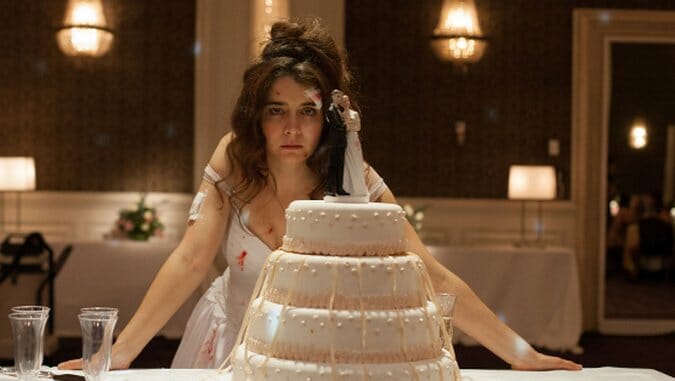Wild Tales

Six seemingly disparate stories—ranging from the quirky to the macabre—unfold with plenty of punch and panache in Damián Szifrón’s Wild Tales, an old-school anthology film laced with biting social commentary about Argentinean class and how one’s sense of justice plays into where one’s lot has fallen in life. Equal parts Amazing Stories, Creepshow, O. Henry and Almodóvar (who both produced and brought the film to an international audience), Wild Tales was a big pleaser at Cannes, recently opened the 38th Annual Portland International Film Festival and may win a Best Foreign Language Film category at the 2015 Academy Awards, to name but a few accomplishments. Seems like people the world over are finding a lot to identify with.
The more-than-appropriate title (Relatos Salvajes in Spanish) might be a bit on the obvious side—and just in case you’re not getting Szifrón’s broad picture, the film’s opening credit sequence serves up image after image of sinister-looking beasts in their unwelcoming habitats, like a PowerPoint slideshow set against Gustavo Santaolalla’s lilting, slightly menacing score. The most wickedly outrageous vignette comes even before the opening credits roll: a music critic (Darío Grandinetti) on an airplane realizes the woman in the seat next to him (María Marull) is the ex-girlfriend of an aspiring musician he once panned. The six degrees of separation don’t end there, or even in that row, leading to a collective gasp among passengers as each person begins to understand their fated place on the plane. This short story, coupled with the credits, form a striking opening sequence, an appropriate preparation for the sometimes overt but nonetheless entertaining yarns to follow, in which Szifrón peruses human animalism in its many dire colors.
Take the segment entitled “The Proposal,” wherein a wealthy powerbroker (Oscar Martinez) decides the best way to get his “too drunk to remember” son (Alan Daicz) out of a hit and run predicament is to pay his loyal landscaper (Germán de Silva) to take the fall. An exhausting debate—to the point that it becomes difficult to watch—about the amount of compensation ensues (as well disputes over sufficient bribes for both the family lawyer and the insurance attorney), overshadowing the fact that the victim of the accident was a pregnant woman. When the son declares that he will step forward and accept the rightful blame, he is quickly shushed.
More eye popping and perhaps the most universal of the collection (Because who hasn’t been red-faced when another motorist has done you wrong?) is the road-rage grudge match between an Audi-driving yuppie (Leonardo Sbaraglia) and a slow-poke in a beat-up old pickup (Walter Donado). The players on the surface cave toward stereotype, but Szifrón, who clearly has a nose for the language of confrontation and human folly, deftly maintains believability as the stakes rise from harsh words, to angry door bashing, to a visual punchline as ridiculous as it is perfectly suited to the tone of these two peoples’ hyper-masculine anger. This follows the bloodiest installment, which revolves around a timid waitress (Julieta Zylberberg) who randomly encounters the loan shark (César Bordón) vicariously responsible for her father’s demise.
-

-

-

-

-

-

-

-

-

-

-

-

-

-

-

-

-

-

-

-

-

-

-

-

-

-

-

-

-

-

-

-

-

-

-

-

-

-

-

-








































